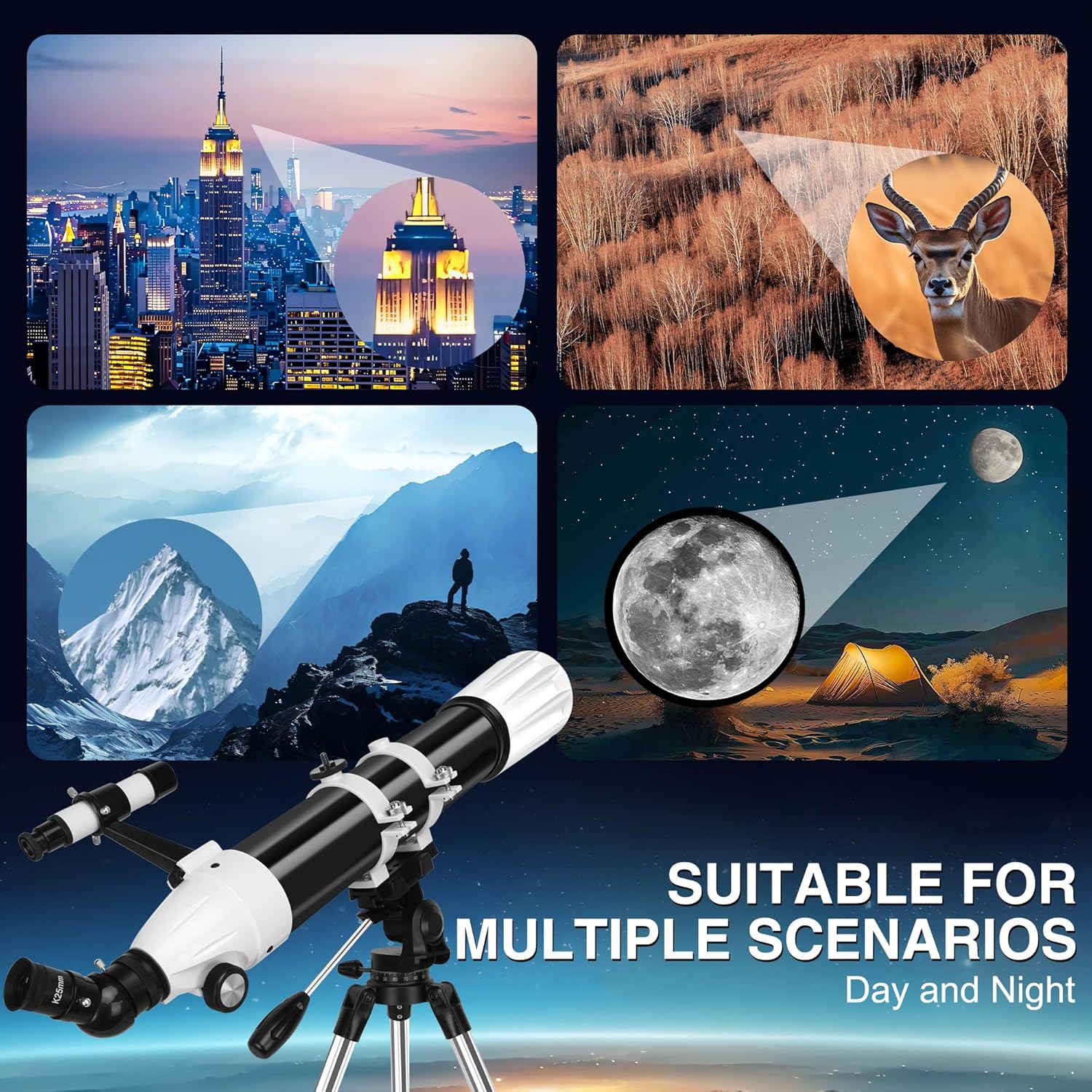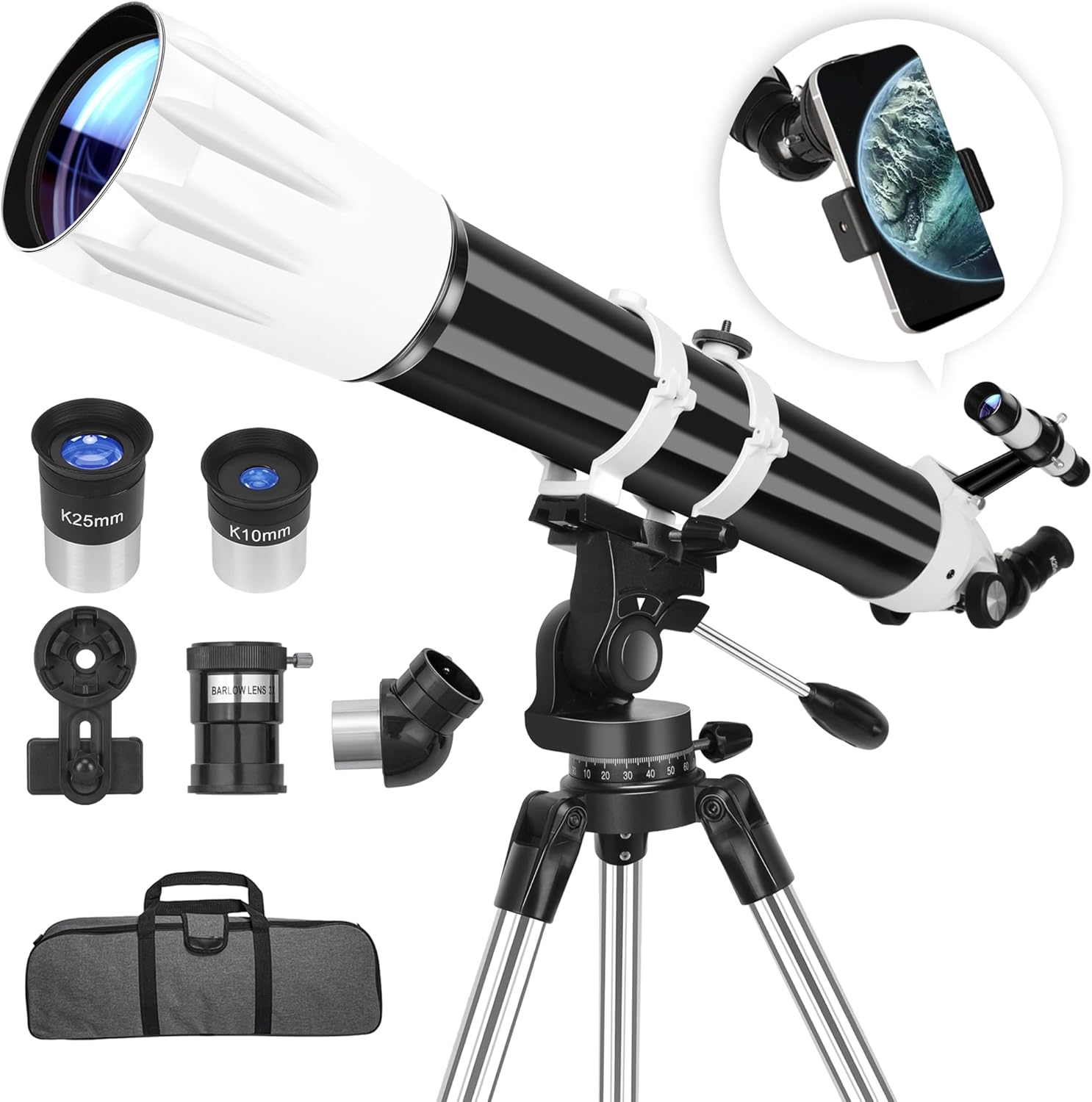






Price: $239.99
(as of Apr 11, 2025 14:08:52 UTC - Details)
The Best Telescope for Beginners: A Comprehensive Guide
Introduction
If you're looking to explore the night sky, finding the best telescope for beginners can be a thrilling yet overwhelming task. With so many options available, it’s easy to feel lost in a sea of specifications and features. This guide aims to simplify the process for you, helping you select the perfect telescope that suits your needs. Whether you're interested in observing planets, stars, or the moon, we’ll cover everything from the types of telescopes available to essential accessories. So, let’s dive in and uncover the best telescopes for those just starting their astronomical journey!
Understanding Types of Telescopes
Refractor Telescopes: A Beginner's Choice
One of the most popular types of telescopes for beginners is the refractor telescope. These telescopes use lenses to gather light, providing clear and bright images. They are ideal for viewing celestial objects like the moon and planets. If you're looking for ease of use and maintenance, a refractor telescope might be the best telescope for beginners.
Reflector Telescopes: A Closer Look
Reflector telescopes are another excellent option for beginners. Using mirrors instead of lenses, they can gather more light, making them great for observing faint objects like distant galaxies. While they may require a bit more setup and maintenance, many enthusiasts find that the quality of the images they produce is well worth it. If you're interested in deep-sky observations, consider a reflector telescope as a viable option.
Compound Telescopes: The Best of Both Worlds
Compound telescopes, or catadioptrics, combine the features of both refractors and reflectors. They are versatile and can be used for a variety of astronomical observations. If you’re looking for a telescope that offers great portability and performance, a compound telescope could be the best telescope for beginners who want a bit of everything.
Key Features to Consider
Aperture: The Size Matters
When choosing a telescope, one of the most crucial factors to consider is the aperture size. The aperture refers to the diameter of the telescope's main lens or mirror. A larger aperture allows more light to enter, resulting in clearer and brighter images. As a beginner, aim for a telescope with an aperture of at least 70mm for refractors and 100mm for reflectors. This ensures you can see a variety of celestial objects without breaking the bank.
Portability: Take It Anywhere
If you're planning to travel to different locations for stargazing, portability should be a top consideration. Look for a lightweight and compact design that’s easy to transport. Some telescopes come with adjustable tripods or carry bags, making them ideal for beginners who want to explore various viewing spots.
Mount Type: Stability is Key
The mount of your telescope plays a significant role in your viewing experience. There are two main types of mounts: altazimuth and equatorial. Altazimuth mounts are easier for beginners as they move up and down as well as side to side. Equatorial mounts, while more complex, allow for tracking celestial objects as the Earth rotates. As a beginner, you might find an altazimuth mount more user-friendly.
Essential Accessories for Beginners
Finderscope: Your Guiding Light
A finderscope is a small telescope mounted on your main telescope that helps you locate objects in the sky. It provides a wider field of view, making it easier to find celestial bodies. For beginners, investing in a good finderscope can enhance your stargazing experience by simplifying the process of locating stars and planets.
Eyepieces: The Key to Magnification
Eyepieces are crucial for adjusting the magnification of your telescope. Most telescopes come with a standard eyepiece, but adding a few different eyepieces to your collection can enhance your viewing experience. Higher magnification eyepieces are great for detailed views of planets, while lower magnifications are better for observing larger objects like star clusters.
Star Charts and Apps: Your Astronomical Guide
As a beginner, having access to star charts or astronomy apps can significantly improve your stargazing experience. These tools help you identify constellations, planets, and other celestial objects in the night sky. Many apps even provide real-time tracking, allowing you to see what’s currently visible based on your location.
Top Recommendations for Beginners
Best Overall: Celestron Astromaster 70AZ
The Celestron Astromaster 70AZ is often considered the best telescope for beginners due to its ease of use and excellent optics. With a 70mm aperture, it provides clear images of the moon and planets. The altazimuth mount allows for smooth movement, making it beginner-friendly. Plus, it comes with a finderscope and two eyepieces to get you started right away.
Best Reflector: Orion StarBlast 4.5
If you’re leaning towards a reflector telescope, the Orion StarBlast 4.5 is a fantastic choice. Its 4.5-inch aperture allows for impressive views of deep-sky objects. It’s compact and lightweight, making it easy to transport. The included accessories make it a complete package for anyone new to astronomy.
Best Compound: Celestron NexStar 4SE
For those looking for a compound telescope, the Celestron NexStar 4SE is an excellent option. It features a 4-inch aperture and a computerized GoTo mount that makes locating celestial objects a breeze. This telescope is perfect for beginners who want to explore the night sky with minimal hassle.
Where to Buy Your Telescope
Amazon: A Trusted Source
When it comes to purchasing your first telescope, Amazon is a reliable option. With a wide selection of telescopes and accessories, you can easily compare different models and read customer reviews. Plus, Amazon often has competitive prices and fast shipping, making it convenient for new astronomers to get started.
Local Astronomy Shops: Expert Advice
If you prefer to see the telescope in person before buying, check out local astronomy shops. The staff can provide valuable insights and help you find the best telescope for beginners based on your needs and budget. This option is particularly beneficial if you have questions about setup or accessories.
Conclusion
Choosing the best telescope for beginners doesn’t have to be a daunting task. By understanding the different types of telescopes, key features, and essential accessories, you can make an informed decision. Remember to consider your interests, whether it’s viewing planets or deep-sky objects, and choose a telescope that fits your needs. With the right equipment and a little practice, you’ll be well on your way to exploring the wonders of the universe. Happy stargazing!
High Powered Astronomical Telescope : Hawkko 90900 is an astronomical telescope for adults high powered. Support powerful magnification from 36X to 270X with 900 mm focal length(f/10 mm). Grab this professional telescope for adults and explore the moon
Outstanding Optical Performance : This astronomical telescope features a large 90 mm aperture and fully multi-coated glass lens, ensuring high light transmission and clear, high-contrast images. Enhances the enjoyment of celestial and moon observations
Flexible, Stable and Portable : Telescopes for adult astronomy come with a multifunctional AZ mount tripod made of stainless steel. It allows easy adjustment of direction and height. This portable telescope is suitable for outdoor backyard stargazing.
Easy Setup and Capture Moments : This telescope for beginners can be easily installed and used with detailed instructions. Connecting to your smartphone with your phone adapter, quickly locate the target object with an app and easily capture images and videos.
Accessories and Support : This refractor telescope includes finderscope, zenith mirror, 25 mm and 10 mm eyepieces, Barlow lens (3X), AZ mount tripod, carry bag, accessory tray, phone adapter. Hawkko's technical team will support you all the time.
